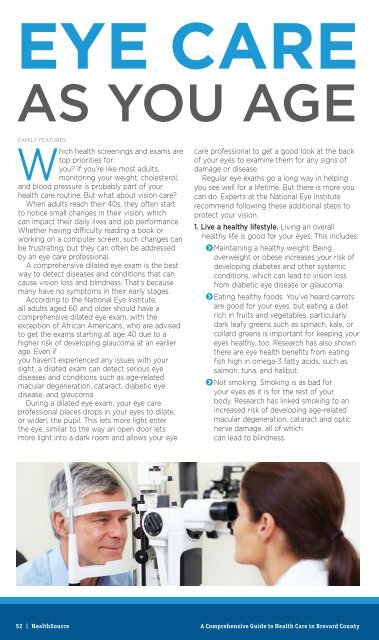Brevard Health Source 2016
HealthSource is your guide to health care services in Brevard County. It includes an up-to-date description of doctors practicing in the Brevard area. Physicians are listed by specialty, in alphabetical order. HealthSource lists hospitals, clinics and other health care professionals in the Brevard area, including dentistry, chiropractic, mental health, ophthalmology, optometry, and advanced nursing.
HealthSource is your guide to health care services in Brevard County. It includes an up-to-date description of doctors practicing in the Brevard area. Physicians are listed by specialty, in alphabetical order.
HealthSource lists hospitals, clinics and other health care professionals in the Brevard area, including dentistry, chiropractic, mental health, ophthalmology, optometry, and advanced nursing.
Create successful ePaper yourself
Turn your PDF publications into a flip-book with our unique Google optimized e-Paper software.
EYE CARE<br />
AS YOU AGE<br />
FAMILY FEATURES<br />
Which health screenings and exams are<br />
top priorities for<br />
you? If you’re like most adults,<br />
monitoring your weight, cholesterol,<br />
and blood pressure is probably part of your<br />
health care routine. But what about vision care?<br />
When adults reach their 40s, they often start<br />
to notice small changes in their vision, which<br />
can impact their daily lives and job performance.<br />
Whether having difficulty reading a book or<br />
working on a computer screen, such changes can<br />
be frustrating, but they can often be addressed<br />
by an eye care professional.<br />
A comprehensive dilated eye exam is the best<br />
way to detect diseases and conditions that can<br />
cause vision loss and blindness. That’s because<br />
many have no symptoms in their early stages.<br />
According to the National Eye Institute,<br />
all adults aged 60 and older should have a<br />
comprehensive dilated eye exam, with the<br />
exception of African Americans, who are advised<br />
to get the exams starting at age 40 due to a<br />
higher risk of developing glaucoma at an earlier<br />
age. Even if<br />
you haven’t experienced any issues with your<br />
sight, a dilated exam can detect serious eye<br />
diseases and conditions such as age-related<br />
macular degeneration, cataract, diabetic eye<br />
disease, and glaucoma.<br />
During a dilated eye exam, your eye care<br />
professional places drops in your eyes to dilate,<br />
or widen, the pupil. This lets more light enter<br />
the eye, similar to the way an open door lets<br />
more light into a dark room and allows your eye<br />
care professional to get a good look at the back<br />
of your eyes to examine them for any signs of<br />
damage or disease.<br />
Regular eye exams go a long way in helping<br />
you see well for a lifetime. But there is more you<br />
can do. Experts at the National Eye Institute<br />
recommend following these additional steps to<br />
protect your vision.<br />
1. Live a healthy lifestyle. Living an overall<br />
healthy life is good for your eyes. This includes:<br />
Maintaining a healthy weight. Being<br />
overweight or obese increases your risk of<br />
developing diabetes and other systemic<br />
conditions, which can lead to vision loss<br />
from diabetic eye disease or glaucoma.<br />
Eating healthy foods. You’ve heard carrots<br />
are good for your eyes, but eating a diet<br />
rich in fruits and vegetables, particularly<br />
dark leafy greens such as spinach, kale, or<br />
collard greens is important for keeping your<br />
eyes healthy, too. Research has also shown<br />
there are eye health benefits from eating<br />
fish high in omega-3 fatty acids, such as<br />
salmon, tuna, and halibut.<br />
Not smoking. Smoking is as bad for<br />
your eyes as it is for the rest of your<br />
body. Research has linked smoking to an<br />
increased risk of developing age-related<br />
macular degen eration, cataract and optic<br />
nerve damage, all of which<br />
can lead to blindness.<br />
52 | <strong>Health</strong><strong>Source</strong> A Comprehensive Guide to <strong>Health</strong> Care in <strong>Brevard</strong> County

















